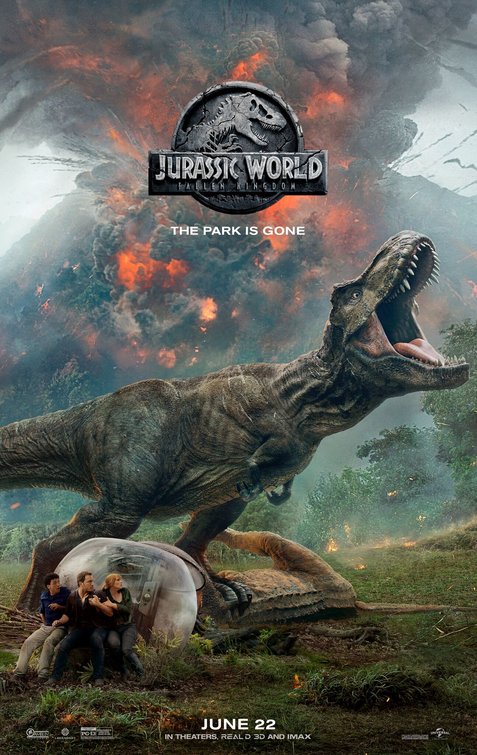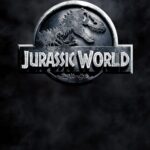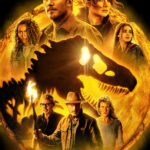The Park Is Gone
Director
JA Bayona
Starring
Bryce Dallas Howard
Chris Pratt
Rafe Spall
Isabella Sermon
The story opens three years after the events in Jurassic World, the park is wild and largely reclaimed by nature but opportunists and poachers continue to scavenge from the site in the hopes of getting a jump-start on the bio-technology. Claire Dearing [Howard] is now running a protection group, hoping to save the dinosaurs on the island from a second extinction event as the dormant volcano on Isla Nublar has become active. John Lockwood (portrayed by James Cromwell), the former partner of John Hammond, has put his subordinate Eli Mills [Spall] in charge of a rescue operation to preserve as many species as they can. As the dinosaurs are all chipped, they require Claire’s handprint login to track them, more than that, they have their eye on the only surviving velociraptor and Claire enlists Owen Grady [Pratt] to help but their relationship is strained and Mills’ motives aren’t all that they appear.
Before I go any further, I would like to highlight a quote from The Lost World: Jurassic Park: “Don’t worry, I’m not making the same mistakes again” “No, you’re making all new ones.” This, to me, embodies the core problem with everything that followed Jurassic Park; I genuinely don’t believe any of the four sequels have come close to the original and no matter how often they try and rework the formula, the positive elements crumble under the weight of colossally disappointing or flat-out terrible ones. A lot of the issues here can be attributed to most contemporary blockbusters which prioritise moments over logic and narrative reasoning; usually for marketing purposes. But this leaves us with pleasing developments that work rather well amongst the connective dross that loosely strings them together. Things like the image used in the above poster, the actual moment in the film is remarkably stupid and everything surrounding it defies logic; from Owen meeting up with Claire and Franklin (played as a walking cliché by Justice Smith) despite the size of the island, to discovering the gyrosphere, to the fact that said gyrosphere is avoided by a stampede despite the surrounding environment being demolished, then we have a dinosaur circling the orb trying to eat Owen but then the T-Rex appears to kill the other carnivore only to then run away! It’s all nauseating nonsense reminiscent of that painful dinosaur stampede in Peter Jackson’s King Kong. What does any of this do other than provide a heightened tickbox set-piece? It certainly doesn’t generate suspense as the threat feels phony – and while I always fall back on the James Bond argument (the conceit that it’s not if Bond will get out of peril, it’s how), the lack of coherent progression disconnects the audience from a sense of earned urgency.
On top of that, we have to put up with so many stupid decisions from both the human and dinosaur contingent. People being arrogant and dumb I can understand. A trained hunter who steps into a cage after an animal passes out, assuming it’s completely tranq’d is entering more into a territory of such disbelief that the usual suspension isn’t sufficient. But it still gets a pass because I can maintain that humans can be clouded by their own motivational drives. What I can’t understand is a film that breaks the logic or rules that it establishes. If a science fiction or fantasy film introduces a status quo fact, it cannot then simply ignore it for plot convenience; in this case I am talking about animal inconsistency and the extreme overuse of dino ex machina. Throughout these films we have been told about the patterns of these animals, that they move in herds, that alpha specimens can have influences over others, that they are communicating and breeding, that they are capable of extraordinary acts, etc. And yet whenever we witness these creatures loosed, they conform to stupid human logic. The indoraptor, a refined hybrid that should constitute as a spoiler but it’s in every trailer, is whatever the scene needs it to be at that time: a silent apex predator that can smell prey from a mile away before relentlessly tracking and pursuing it or a moronic beast that is extraordinarily clumsy and can be outrun by a child. It’s lazy writing and has given rise to the “a dinosaur will run in and save the day” cliché which is posing as homage to the closing scene from the first film. This trope has been exploited so much that any time the situation looks dire, I fully expect a T-Rex to silently enter from screen left and bite the problem. Stuck in a lift? No way out and a fire has started in the control panel? *Chomp* T-Rex eats the problem. The two people a character has been crushing on are meeting for the first time and the semi-cute-meet “how do we all know each other” puts him/her in an awkward positon? *Roar* T-Rex creates a distraction and the lead gets to avoid confronting this problem until later in the third act.
What is interesting is that if you scratch away the blockbustery studio mandated components, you are left with a very simple, minimalised story presenting a basic question about the consequences of the advancement of technology – which is very indicative of Michael Crichton’s work. But as stated, this factor is so buried under the mountainous action quota that it becomes a fleeting, scantly revisited set of interesting thought experiments: the ecological philosophy behind saving animals that we manufactured, the concept of government involvement on a private island, the moral culpability and responsibility of those involved, the grey-area difference between exploiting animals for experiments and war over captivity and entertainment, the lengths of meddling with death and resurrection but I’ll expand on all of that later. The truth is, these kinds of issues are usually better left as open-ended conversation starters, like The Twilight Zone or Black Mirror because following something like this to its conclusion will change the face of the established world so much that it will alter the relatability of the grounded world around it. In other words, if you introduce a fantastical element and state that it has been normalised for decades, you cannot say the world will completely mirror our own and while that’s a great launchpad for stories it can quickly deviate to the absurd; for an example, see Independence Day: Resurgence.
Another element that strongly links this feature with the original – and one that Jurassic World didn’t use as well – is the welcome return of extensive animatronic puppetry. It feels like we are finally getting back to a point where computer generated imagery and practical effects can work in harmony, complimenting each other, rather than in direct competition and the film succeeds greatly because of it. There are also fascinating behind the scenes practical technics, such as an outdoor rollercoaster track which was built for the gyrosphere descent over a cliff-edge, generating a genuine reaction of both fear and gravity on the body. But as much as I love the ingenuity and creativity of this kind of filmmaking, it’s brutalised and all but lost in fast-paced editing and a frankly absurd sequence devoid of consequence. And that’s why I’ve rated this film the way I have; so many technical aspects are working exceptionally well, the cinematography is great, Michael Giacchino’s score gives us enough new material to evolve the familiar themes, the practical and digital effects are genuinely impressive, make-up, costumes, set design, all of them are performing at peak levels but the story fails them every single time. If I was rating on story alone, this film would be a travesty but the amount of work that has gone into its execution is truly praiseworthy.
The prospect of a zoo-like environment failing is a terrifying and relatable prospect and one which illustrates man’s arrogance when it comes to controlling environments. Zoos, circuses, theme parks, things we create for our amusement at the expense of something wild is a playground for What If fiction and while this film follows the same lines it is somehow less rewarding and stretches into fantasy territory. As stated earlier, I believe this is a problem with the nature of Michael Crichton’s work and why the only sequels and follow-ups he produced were at the pressure and behest of others rather than from a creative desire to further a story. And yet it’s not impossible, the “where do you go from here” is not out of our reach and to prove that, one need only look to the Planet Of The Apes prequels. The major difference there is that the story gave us a very emotionally relatable core along with ground-breaking motion capture techniques, to the degree that we were vested in the non-human story more than the one we would traditionally empathise with. But Jurassic Park isn’t those films, it’s always billed as a monster movie and as much as they push this “Blue is the chosen one” storyline, it’s not sticking because through both the performance and circumstance, I simply don’t buy the connection.
At the end of the day, Fallen Kingdom is another instalment in a long line of mediocre continuations that brings very little to the series but the way this one ends gives me the impression that we will get something very new next time – whether that will be positive or not, remains to be seen.
Release Date:
8th June 2018
The Scene To Look Out For:
**extreme spoilers throughout this whole section**
The film closes pretty much back where it started, with the moral quandary of do these creatures deserve a chance to live again or have the repeated incidents highlighted that this is simply a bad idea which needs to be stopped at all costs. Having spent the majority of the film weighing the options, Claire makes the decision to not save the dinosaurs and in a rather traumatic gas chamber sequence, we have a Toy Story 3 fake-out, leading audiences to believe that they may witness something surprisingly adult in this relatively light action fare. And in that moment, the doors open and the dinosaurs are unleashed on California. With a town in running distance, several species of herbivore and carnivore are let loose on a completely unprepared environment and populace. As the camera pans, we reveal Lockwood’s granddaughter Maisie [Sermon] has activated the door, explaining that these animals deserve the chance to live. And my face immediately contorted into some twisted mesh of disgust and outrage and my internal monologue screamed, “What the fuck!? You made the wrong choice kid! Who.. who the fuck put the child in charge!?” If you’re reading this, I’ll assume you know the movie’s big twist, that Lockwood’s granddaughter is in fact a clone of Lockwood’s deceased daughter, which understandably caused a rift between Hammond and Lockwood. This is a development that I have such contention with. On the one hand, it’s a fascinating and natural evolution of where this technology could and would progress to but on the other it steps away from the simplicity of “park goes offline, animals get out” but doesn’t give it enough time to really develop into anything rewarding enough. Maisie’s justification for her action is to compare the dinosaur’s right to exist with that of her own; again, another HUGE moral quandary that this film has done so little to explore. But it’s all irrelevant, Maisie pressing the button is symbolic of a franchise that has never really worked outside of the first and should be left to die but the kids have voted and regardless of consequence, they have demanded more.
Notable Characters:
There isn’t one human character I have liked in these last two Jurassic Park films. Say what you will about The Lost World and Jurassic Park III at least they had Goldblum or Neill entertaining us with their expertise and cantankerous observations. What do we get? Owen fucking Grady. Pratt’s character continues to be the worst in the entire Jurassic Park franchise – yeah, I’m including Paul Bowman and Amanda Kirby in that. A lot of larger than life personalities have made their mark on this series and sometimes their absurdity can elevate the film. But Grady is a mess, he is consistently selfish yet superheroic in his actions, not to mention the fact he’s practically immortal. Without meaning to sound ridiculous, he is a representation of how America sees itself, a lone hero fighting against the odds for a little peace and quiet; you know, a real conservative wet-dream. But at no point does the character or the film really acknowledge that this charming yet outdated cowboy archetype is the villain. Owen trains the raptors but refuses to accept responsibility that his work could/would be imitated by others, his interactions with other humans devolves to that of a thuggish child and his plot-armour driven “I don’t know what I’m doing but this will work out” attitude puts everyone at risk but never fails so nothing is learned. And this isn’t the case of another Peter Quill because that individual experienced genuine arrested development and culture shock through displacement, this is an ex-military individual who works with animals but displays the tendencies of someone who simply doesn’t live in the real world. And when you have a film that is filled with genetically resurrected dinosaurs, you need lots of real world to make the Jurassic bit work.
Highlighted Quote:
“Change is like death, you don’t know what it looks like until you’re standing at the gates”
In A Few Words:
“As with every other Jurassic Park sequel, there are lots of interesting questions asked but all of them take a back-seat to some fairly uninspired action sequences”
Total Score: 2/5

![The Red Right Hand Movie Reviews [Matthew Stogdon]](https://reviews.theredrighthand.co.uk/wp-content/uploads/2021/12/cropped-header1.png)



